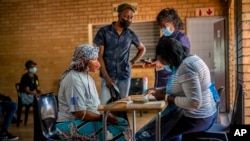Coronavirus cases have risen rising dramatically in South Africa since the discovery of the omicron variant. Government and other entities are scrambling to vaccinate more people to avoid severe cases.
Vaccines can’t guarantee you won’t be infected by the coronavirus, but they can save your life. That was the message South Africa’s health minister Joe Phaahla delivered today as the country enters its fourth wave.
More than 11,000 people tested positive on Thursday alone — a massive spike from the roughly 330 daily cases being detected two weeks ago.
Phaahla says now is not the time to be hesitant toward vaccines.
“No one amongst our scientists ever said to us that the vaccines will prevent us from being infected with the virus. But that what they have always said, and which were seeing as this wave’s getting into operation, that 80 to 90% when you are vaccinated, you'll get mild illness.”
While vaccines are widely available, less than half the adult population has been inoculated.
The omicron variant that was discovered by South African scientists last month is driving the new wave of infections.
What is clear is that vaccinated people are making up just 2% of hospitalizations.
“There's definitely early evidence that this virus, or this variant, is more transmissible and also early evidence that there is some degree of immune escape. Vaccination will prevent against the severe disease, but you may still get infections, even though you've been vaccinated,” said Dr. Michelle Groome, South Africa’s National Institute for Communicable Diseases.
The severity of the omicron variant is not yet fully clear, with scientists saying more data is still needed.
What is different from previous waves is that a higher number of children under the age of 5 are being hospitalized.
However, Groome says it is still too early to be certain of the risks and severity for children. “But I think we do just need to highlight the importance of surge preparation, preparedness, to also include pediatric beds and staff.”
Vaccines are not yet available to children under the age of 12 in South Africa. Approval for such use is not likely to come until the new year, officials said.
In the meantime, nonprofits and community groups remain focused on the most vulnerable adults.
Sophie Hobbs is the spokesperson for Nacosa, an organization that supports people living with HIV and tuberculosis.
“Given that, that the estimation is that we have 8½ million people in South Africa living with HIV, I think that yes, that message needs to come across very strongly that that people living with HIV must, a, make sure that [they are] taking their medication, because that can protect them, and, b, that they should get vaccinated,” she said.
Nacosa also works with young adults, women experiencing abuse, sex workers and drug users.
Hobbs says while misinformation is playing a role in stopping some of them from getting vaccinated, there are more complicated reasons. “If you don't have a job and you don't have food, and you're living in an unsafe environment, you know, really COVID, the risk of COVID is really the last thing on your mind. It's a socioeconomic issue.”
Health officials are bracing for a surge in patients as seen in previous waves of the pandemic. They say hospitals are being equipped with beds and steady oxygen supplies in preparation.






